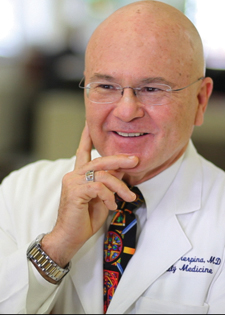 By Victor S. Sierpina, MD
By Victor S. Sierpina, MD
Are we ready for the next pandemic? In a thoughtful essay by Lainie Rutkow, a professor of health policy and management at the Johns Hopkins Bloomberg School of Public Health, calls the field of public health an “invisible discipline.” This has been particularly true during non-crisis periods across the international stage. The essay is published in a recent book, COVID-19 and the World Order: The Future of Conflict, Competition, and Cooperation edited by Hal Brands and Francis Gavin of Johns Hopkins University.
This book is primarily focused, not on public health, but on the impact of COVID-19 on international relations, trade, environment. However, the instigating and unifying theme is the pandemic and how it will affect all our lives going forward. The impact of the pandemic in historical scope and rapidity is likened to the two major world wars in the past century. These wars shook the foundations of civilization, nations, commerce, diplomacy, and thus re-ordered the world. Such a re-ordering is now taking place. While it does, we must make sure our health care systems including our public health care are fully prepared and re-invented.
How can it be that public health is an “invisible discipline” as Dr. Rutkow attests? Clearly, public health measures from sanitation, safe food and water supplies, widespread immunization programs, quit smoking campaigns, and containment of epidemics like AIDS, SARs, malaria, cholera, yellow fever, tuberculosis, and many more have lengthened both quality and quantity of life throughout the world.
Perhaps we have become lackadaisical and take these advances as a given, part of our infrastructure. Such advances in public health have created enormous impacts, doubling life expectancy in some countries over the last century. This perhaps unwittingly led to the overpopulation that has set the stage for pandemics, encroachment on natural habitats and resultant zoonosis and spillovers, the source of the recent pandemic will likely continue.
There is nothing like a new healthcare crisis to show the fault lines and vulnerabilities of public health measures locally, nationally, and internationally. According to several authors in the book, COVID 19 and World Order, the clear failures of the World Health Organization, influenced by financial and political pressures from China, delayed the announcement of the Wuhan person-to-person infection for critical weeks while it spread globally by international travel.
I was a near victim myself in early February of this year. Our cruise ship debarked my wife and I in Tokyo mere hours before a man infected with COVID boarded. He sickened and left the Diamond Princess in Hong Kong a few days later for hospitalization. Other than getting our temperatures checked during shore excursions, we had no clue of a virus that had been identified weeks, perhaps months earlier. The 4000 passengers and crew on the next Diamond Princess tour were quarantined at sea for weeks. Close call.
If we take no greater lesson from the pandemic, it is that we can and must shore up our public health system. We ought to prevent or contain, not treat pandemics. Vaccines and medical treatments are reactive, not proactive.
In a recent article by the former Center for Disease Control Director, Dr. Tom Frieden published in the Wall Street Journal (December 5, 2020), he poses the question of how we prepare the world for the next threat:
“Public health systems world-wide need much better tracking systems to sound an early alarm, as well as laboratory networks to find new diseases, detectives to investigate them, rapid-response teams to tackle them, and legal, communication and financial frameworks to make all that possible. We will also need better primary care world-wide to deliver vaccines and manage chronic conditions. As an investment for wealthier countries, international organizations, and NGO’s, this is a bargain: Every dollar spent on global health security could save $100 or more in the costs of future pandemics. Like earthquakes, we know they are coming, even if we don’t know where or when. We were caught unprepared this time; that shouldn’t happen again.”
The vaccines are certainly a welcome development and were expedited beyond belief from the usual development period of a decade to a few months. However, their impact still relies on major public health strategies, including distribution, administration, public education. Even before the vaccine was released, an “anti-vax” movement has started.
Dr. Anthony Fauci recently was quoted in TIME magazine as saying, “The big message is that we have an additional tool for fighting COVID-19, but we don’t have a tool to replace everything we do just yet. Hopefully as the country and world gets massively vaccinated, this virus will be essentially backed in, with no place to go because everybody is protected.”
Let’s be ready for the next one. Public health must be promoted to the forefront. Prevention, education, health promotion, primary care, immunization, nutrition, environmental measures: all these are parts of the jigsaw puzzle that can unify our measures across the planet to the benefit of all of humanity.


